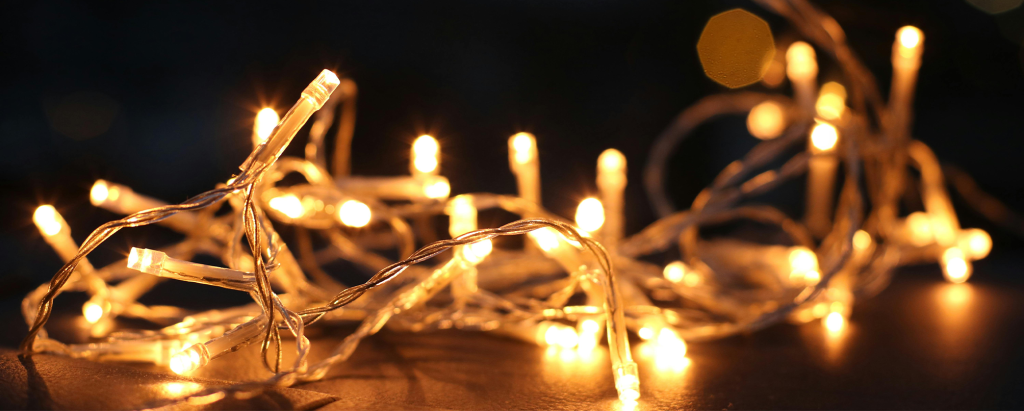If you are like me, for whom the unstoppable frolicking of Christmas lights inside and outside the house is an almost addictive “boost” of your mood, you will surely be wondering how much the Electricity Authority of Cyprus bill will ‘sting’ you after the holidays.
To answer your question – as well as mine – we asked the spokesperson of EAC, Christina Papadopoulou, to explain to us how inefficient in electricity consumption the Christmas lights are, as well as to analyze the method by which each one of us can calculate in advance the final cost that we will incur from their use.
On this occasion, however, Mrs. Papadopoulou also gives us tips for saving energy and money throughout the year, while explaining how and to what extent the installation of photovoltaic panels in our homes contributes to this.
Interview: Nicola Karatzia

Translation: Stephie Karagiorge
How costly in consumption are Christmas lights?
In general, Christmas lights do not have a high consumption of electrical energy.
Not even when we keep them on all night?
Even then, they do not exhibit particularly high energy consumption.
Is it true that in order to calculate the cost of the electricity that the lights will consume during the holiday season, we should first multiply the Watts by the hours that the lights will be operating for, and then, by the current price of the kilowatt-hour?
Yes, indeed, this is the method that is followed, and I will analyze it below with examples.
• If a box of lights is 100 Watts and they will operate for 12 hours (from 18:00 when it gets dark until 06:00 in the morning), then 100 x 12 = 1,200 Watts, which is 1.2 kWh at € 0.30 = € 0.36 for one night. For two months, the cost will be € 0.36 x 60 = € 21.6.
• If a box of lights is 200 Watts and they will operate for 12 hours (from 18:00 until 06:00 am), then 200 x 12 = 2,400 Watts, which is 2.4 kWh at € 0.30 = € 0.72 for one night. For two months, the cost will be € 0.72 x 60 = € 43.2.
How much money can homes with installed photovoltaic systems save during the festive days from increased energy consumption?
Photovoltaic systems operate and generate energy when there is sunlight. Usually, during the winter days of the year, there is less sunlight, resulting in homes with installed photovoltaic systems purchasing electric energy from the Electricity Authority of Cyprus grid.
At this point, it would be helpful to explain what the Net Metering method is exactly.
With the Net Metering method, at the end of each two-month period, the amount of energy that the photovoltaic system fed into the grid during moments that it had surplus (export) is recorded, along with the corresponding amount that it “drew” from the grid during the moments when it had a deficit (import). If, for example, the export is greater, the difference is credited and transferred for use in the upcoming two-month period, while it is reset once every three years.
In case the import is greater, the difference is charged at the current rate per kilowatt-hour. That is, if the price of the kilowatt-hour is € 0.10, and in the specific household there was an import of 800 kWh and an export of 600 kWh (deficit of 200 kWh), it will be charged for the energy cost: 200 kWh x € 0.10 = € 20.
Additionally, it will be charged for the cost of using the grid, which is equal to the electricity drawn from the grid (800 kWh), multiplied by the unitary cost of using the grid (€ 0.028/kWh). In other words, in this specific case, it is:
800 kWh x € 0.028 = € 22.40.
Furthermore, there are charges of marginal size, which apply to all consumers and are proportional to consumption (e.g. auxiliary services). According to the Plan of the Ministry of Energy currently in effect, every 3 years, the surplus is reset to zero.
The goal is to use photovoltaics to produce electricity for self-consumption. Ideally, each household – or other small facility – will be able to generate as much electricity as it needs to cover its needs. In this way, the AEC grid will function as a “battery”, absorbing the instantaneous surplus of PV production or as an electricity supplier, when consumption needs exceed production.

If I were to ask you to give us some general advice on reduced energy consumption, what would they be?
There are simple energy-saving tips that each of us could follow, because the reckless use of electricity – waste -, burdens our bills.
As part of the European Union’s “REPowerEU” plan, there are guidelines for energy saving by its member states. Below, I will list some of these guidelines, which can also be implemented year-round in Cyprus.
• In winter, set the air conditioner to 22°C. It is important to know that every degree above this temperature, consumes up to 7% more electricity. Regular maintenance of air conditioners is also crucial, as it can reduce consumption by up to 30%.
• Place refrigerators in well-ventilated areas, away from direct sunlight, and any other heat sources.
• Unplug small electrical appliances – such as chargers – from the socket (power outlet), after use.
• Good insulation significantly reduces cooling losses (e.g. from the ceiling, doors, windows, walls). This way, up to 40% of electrical energy can be saved.
• Perform frequent maintenance of the facilities (reduction of consumption by up to 30%), do not over-cool the space, do not leave doors and windows open.
• Choose electrical appliances with high energy efficiency ratings (A+++, A+) that are more efficient and can save up to 50% electrical energy.
• Dishwashers and washing machines have high energy and water consumption. Therefore, before using them, ensure that they are full and choose the mode with the lowest possible temperature.
• Replace energy-intensive bulbs with LED, as they reduce energy consumption by up to 70% while having up to 10 times longer lifespan.
• Prefer to turn off electrical appliances, rather than leaving them on standby.
• Avoid using a clothes dryer, water kettle, and vacuum cleaner.
• The pressure cooker saves up to 40%-60% energy.
• Ensure cookware fits properly on electric stove burners, in order to avoid unnecessary energy waste.
• Do not open and close the refrigerator, and perform regular defrosting.


